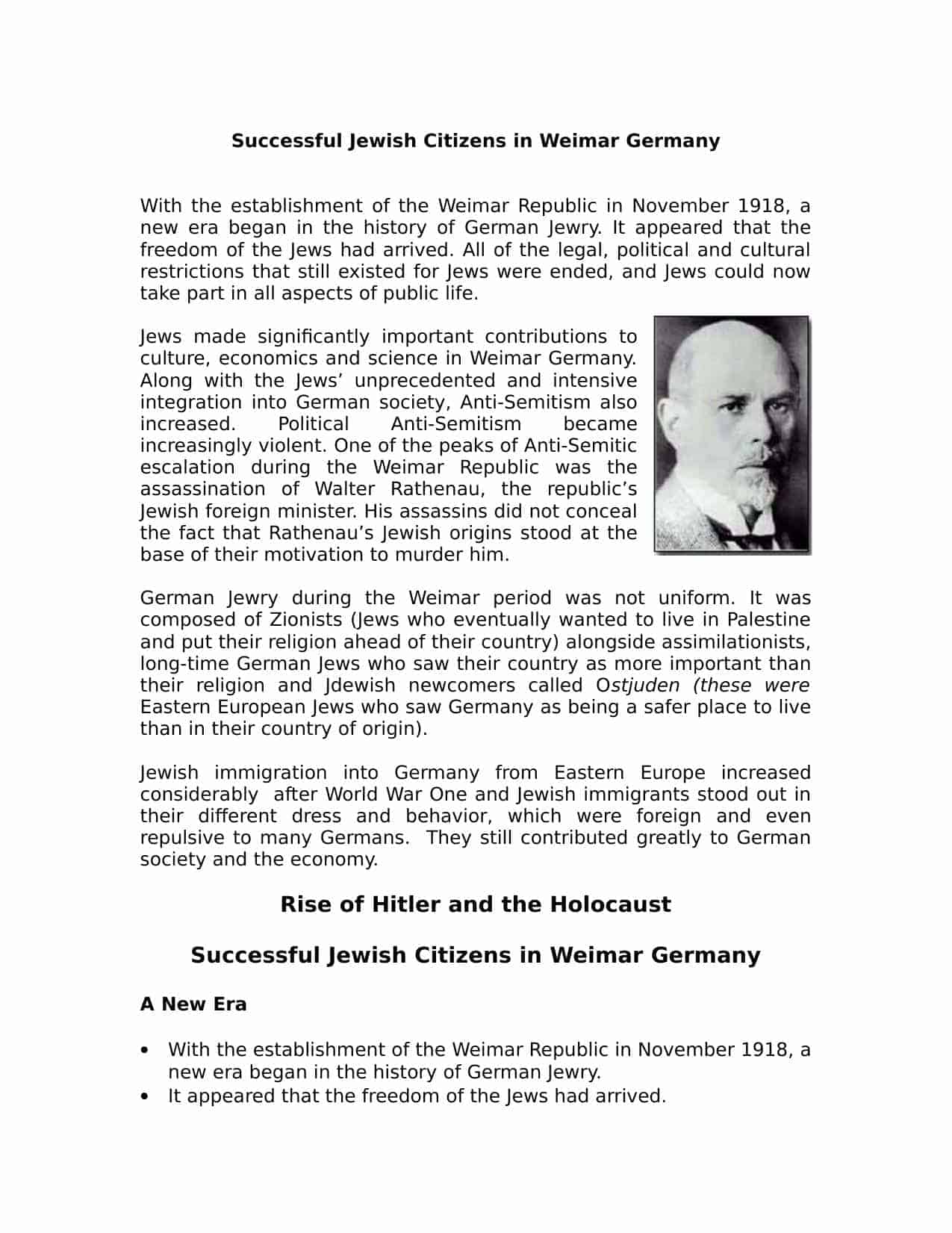Download Successful Jewish Citizens in Weimar Germany
Click the button below to download this worksheet for use in the classroom or at home.
Download →
Lesson Snapshot
With the establishment of the Weimar Republic in November 1918, a new era began in the history of German Jewry. It appeared that the freedom of the Jews had arrived. All of the legal, political and cultural restrictions that still existed for Jews were ended, and Jews could now take part in all aspects of public life.
Jews made significantly important contributions to culture, economics and science in Weimar Germany. Along with the Jews’ unprecedented and intensive integration into German society, Anti-Semitism also increased. Political Anti-Semitism became increasingly violent. One of the peaks of Anti-Semitic escalation during the Weimar Republic was the assassination of Walter Rathenau, the republic’s Jewish foreign minister. His assassins did not conceal the fact that Rathenau’s Jewish origins stood at the base of their motivation to murder him.
German Jewry during the Weimar period was not uniform. It was composed of Zionists (Jews who eventually wanted to live in Palestine and put their religion ahead of their country) alongside assimilationists, long-time German Jews who saw their country as more important than their religion and Jdewish newcomers called Ostjuden (these were Eastern European Jews who saw Germany as being a safer place to live than in their country of origin).
Jewish immigration into Germany from Eastern Europe increased considerably after World War One and Jewish immigrants stood out in their different dress and behavior, which were foreign and even repulsive to many Germans. They still contributed greatly to German society and the economy.
Rise of Hitler and the Holocaust
Successful Jewish Citizens in Weimar Germany
A New Era:
• With the establishment of the Weimar Republic in November 1918, a new era began in the history of German Jewry.
• It appeared that the freedom of the Jews had arrived.
• All of the legal, political and cultural restrictions that still existed for Jews were ended, and Jews could now take part in all aspects of public life.
Jewish Integration:
• Jews made significantly important contributions to culture, economics and science in Weimar Germany.
• Along with the Jews’ unprecedented and intensive integration into German society, Anti-Semitism also increased. Political Anti-Semitism became increasingly violent.
• One of the peaks of Anti-Semitic escalation during the Weimar Republic was the assassination of Walter Rathenau, the republic’s Jewish foreign minister.
• His assassins did not conceal the fact that Rathenau’s Jewish origins stood at the base of their motivation to murder him.
• German Jewry during the Weimar period was not uniform. It was composed of Zionists (Jews who eventually wanted to live in Palestine and put their religion ahead of their country) alongside assimilationists, long-time German Jews who saw their country as more important than their religion and Jewish newcomers called Ostjuden (these were Eastern European Jews who saw Germany as being a safer place to live than in their country of origin).
European Jewish Immigration:
• Jewish immigration into Germany from Eastern Europe increased considerably after World War One and Jewish immigrants stood out in their different dress and behavior, which were foreign and even repulsive to many Germans.
• They still contributed greatly to German society and the economy.
Worksheet Lesson Plan:
- Aimed at Students studying across UK Year 7,8 & 9 or equivalent
- Premium resource
- Use as you wish in the classroom or home environment
- Lesson plan on successful Jewish citizens within Weimar Germany.
- Contains questions throughout the study worksheet.
